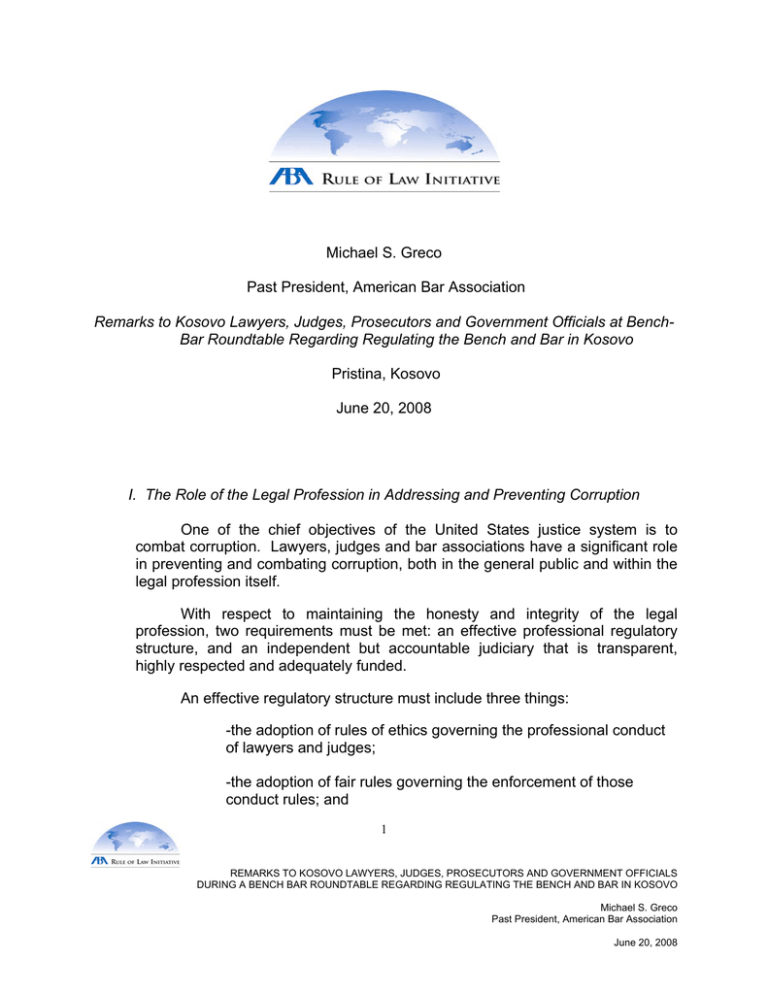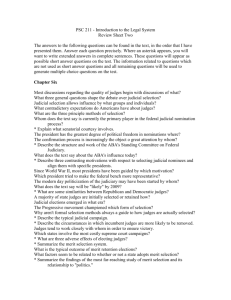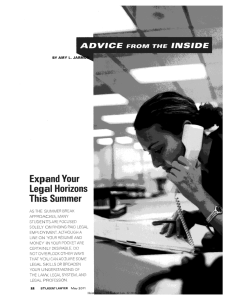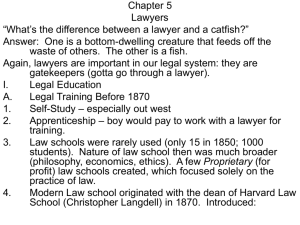Michael S. Greco Past President, American Bar Association
advertisement

Michael S. Greco Past President, American Bar Association Remarks to Kosovo Lawyers, Judges, Prosecutors and Government Officials at BenchBar Roundtable Regarding Regulating the Bench and Bar in Kosovo Pristina, Kosovo June 20, 2008 I. The Role of the Legal Profession in Addressing and Preventing Corruption One of the chief objectives of the United States justice system is to combat corruption. Lawyers, judges and bar associations have a significant role in preventing and combating corruption, both in the general public and within the legal profession itself. With respect to maintaining the honesty and integrity of the legal profession, two requirements must be met: an effective professional regulatory structure, and an independent but accountable judiciary that is transparent, highly respected and adequately funded. An effective regulatory structure must include three things: -the adoption of rules of ethics governing the professional conduct of lawyers and judges; -the adoption of fair rules governing the enforcement of those conduct rules; and 1 REMARKS TO KOSOVO LAWYERS, JUDGES, PROSECUTORS AND GOVERNMENT OFFICIALS DURING A BENCH BAR ROUNDTABLE REGARDING REGULATING THE BENCH AND BAR IN KOSOVO Michael S. Greco Past President, American Bar Association June 20, 2008 -a professional entity for investigating, prosecuting, and sanctioning lawyer and judicial misconduct. II. Regulation of the U.S. Legal Profession The responsibility for regulating the legal profession in the United States lies primarily with the judicial branch of each state. In each state and the District of Columbia, the court of highest appellate jurisdiction has the authority to regulate the practice of law. This includes the adoption of rules of professional conduct and rules and procedures for disciplinary enforcement. The regulation of the legal profession by the judicial branch of government is consistent with the doctrine of separation of powers, and maintains necessary balance among the three branches of government—judicial, legislative and executive. This divided but equal balance of powers is vitally important to a democratic government. Moreover, the ABA has determined that judicial regulation of the legal profession is more effective in protecting the pubic than regulation by the other two branches of government. In the United States an independent judiciary is of vital importance to protecting citizens’ rights and freedoms. An independent and self-governing legal profession, regulated by the judicial branch, is equally important to protecting the rights and freedoms of the public. As noted in the Preamble to the ABA Model Rules of Professional Conduct, an independent legal profession is an important force in preserving government under law, since violation of laws is more effectively challenged by a profession whose members are not dependent on the government for the right to practice. Although a state legislature may, under its police power, act to protect the interests of the public, with respect to the practice of law the legislature does so in aid of the courts—the legislature’s actions do not supersede or detract from the courts’ powers to regulate the bar. The American Bar Association has long supported judicial regulation of the legal profession in each state by the highest court in the state. With respect to discipline of judges, in addition to impeachment and legislative provisions, judicial conduct commissions have been created by state constitutions, court rules, or statutes. First established in 1960, judicial conduct commissions are now a part of every state’s judicial disciplinary process. Sanctions that may be imposed on judge – after a process that affords due 2 REMARKS TO KOSOVO LAWYERS, JUDGES, PROSECUTORS AND GOVERNMENT OFFICIALS DURING A BENCH BAR ROUNDTABLE REGARDING REGULATING THE BENCH AND BAR IN KOSOVO Michael S. Greco Past President, American Bar Association June 20, 2008 process and fairness --include reprimand, suspension, and removal. Typically, the judicial conduct commission makes a recommendation to the state’s highest court regarding appropriate discipline of a judge. While the ABA has no role in the actual disciplining of lawyers and judges, the ABA has an important role in helping state and federal judiciaries in the adoption of codes of ethics and disciplinary procedures. The ABA does so by promulgating Model Rules that are adopted by the states. All the ABA Model Rules regarding lawyer and judicial ethics and enforcement are available on the ABA website at www.abanet.org/cpr. III. Standards Governing the Professional Conduct of Lawyers and Judges A. Overview Because lawyers are officers of the justice system, all ABA-adopted policies relating to lawyers’ and judges’ ethical responsibilities emphasize that lawyers and judges can neither participate in nor assist in the criminal conduct of others. Engaging in such conduct is a violation of the ABA Model Rules of Professional Conduct and the ABA Model Code of Judicial Conduct. It should be noted that the ABA Model Rules for lawyers and judges do not generally use the terms “corrupt” or “corruption.” Instead, such conduct is understood to mean criminal or fraudulent conduct under the relevant Model Rules. B. ABA Model Rules of Professional Conduct I will address several provisions of the ABA Model Rules that deal with criminal or fraudulent conduct -- or corruption -- by lawyers or judges . Rule 1.1 (Scope of Representation) The first and broadest direction to a lawyer with respect to what could generally be categorized as “corrupt” conduct appears in the language of paragraph (d): “A lawyer shall not counsel a client to engage, or assist a client, in conduct that the lawyer knows is criminal or fraudulent…” This Rule leaves no doubt that lawyers simply may not engage in corruption in any way without being subject to discipline. 3 REMARKS TO KOSOVO LAWYERS, JUDGES, PROSECUTORS AND GOVERNMENT OFFICIALS DURING A BENCH BAR ROUNDTABLE REGARDING REGULATING THE BENCH AND BAR IN KOSOVO Michael S. Greco Past President, American Bar Association June 20, 2008 Rule 1.4 (Communication) This Rule requires that a lawyer who realizes that a client seeks assistance to engage in unlawful conduct must inform the client of the lawyer’s refusal to assist the client. Rule 1.6 (Confidentiality of Information) Confidentiality is the foundation of trust between a lawyer and a client, because it enables a lawyer to provide competent, thorough, and effective legal representation. The U.S. legal profession has aggressively resisted efforts by the federal and state governments to undermine that foundation. It is therefore important to note that two of the six exceptions in Rule 1.6 permitting or requiring a lawyer to reveal confidential information relate explicitly to criminal or fraudulent conduct of a client. The first exception allows disclosure of confidential information “to prevent the client from committing a crime or fraud that is reasonably certain to result in substantial injury to the financial interests or property of another.” The second exception permits disclosure “to prevent, mitigate or rectify substantial injury to the financial interests or property of another that is reasonably certain to result or has resulted from the client’s commission of a crime or fraud.” Rule 1.13 (Organization as Client) Corporate wrong-doing occurs world-wide, and the United States in recent years has experienced some notable examples within its borders. ABA Model Rule 1.13 was amended in response to the US Congress’s “Sarbanes-Oxley” legislation relating to corporate governance matters. The Rule can be described briefly as requiring that a lawyer “report up the ladder” of corporate authority in order to ensure that a corporation, through the acts of its officers and constituents, complies with the law. Rule 1.16 (Declining or Terminating Representation) Whenever a lawyer’s representation of a client who engages in criminal or fraudulent conduct directly involves the lawyer in violating the Rules of Professional Conduct, the lawyer is required by this Rule to withdraw as counsel for that client. In addition, a lawyer is permitted to withdraw if the client has used 4 REMARKS TO KOSOVO LAWYERS, JUDGES, PROSECUTORS AND GOVERNMENT OFFICIALS DURING A BENCH BAR ROUNDTABLE REGARDING REGULATING THE BENCH AND BAR IN KOSOVO Michael S. Greco Past President, American Bar Association June 20, 2008 the lawyer’s services to perpetrate a crime or a fraud, or if the lawyer believes that a client’s course of conduct will constitute a crime or a fraud. Rule 3.3 (Candor to the Tribunal) This Rule is specifically directed at ensuring that a lawyer does not assist a client in perpetrating a fraud upon a court or other tribunal. The Rule prohibits a lawyer from assisting a client to testify falsely or the lawyer himself/herself presenting false information to a court, and it places an obligation on the lawyer to report any false representation to a court when the lawyer learns about it. Rule 3.4 (Fairness to Opposing Party and Counsel) This Rule prohibits criminal or fraudulent conduct that is considered to be “corrupt” conduct. The Rule provides that a lawyer may not “unlawfully obstruct another party’s access to evidence or unlawfully alter, destroy or conceal a document or other material having potential evidentiary value.” The Rule also provides that a lawyer shall not “falsify evidence, counsel or assist a witness to testify falsely, or offer an inducement to a witness that is prohibited by law.” Rule 7.6 (Political Contributions to Obtain Government Legal Engagements or Appointments by Judges) This Rule provides that if a lawyer, alone or with other lawyers in his or her firm, makes a political contribution to a government official for the purpose of having such official hire or appoint them to perform legal work, the lawyer is prohibited from accepting such an appointment. As will be seen when I discuss several ethics provisions relating to judges, judges are prohibited from making such appointments of counsel based upon political contributions they have received, or may receive. Rule 8.3 (Reporting Misconduct) This Rule helps to ensure that when one lawyer engaes in misconduct (which would include any type of corrupt activity), any other lawyer who has knowledge of such misconduct is obligated to report the misconduct to the appropriate authority. 5 REMARKS TO KOSOVO LAWYERS, JUDGES, PROSECUTORS AND GOVERNMENT OFFICIALS DURING A BENCH BAR ROUNDTABLE REGARDING REGULATING THE BENCH AND BAR IN KOSOVO Michael S. Greco Past President, American Bar Association June 20, 2008 Rule 8.4 (Misconduct) The final ABA Rule of Professional Conduct I will mention that is relevant to corruption is Rule 8.4, which identifies and lists various forms of lawyer misconduct. Two of its provisions are particularly relevant to corruption: It is professional misconduct for a lawyer to state or imply an ability to influence a government agency or official or to achieve results by means that violate the Rules of Professional Conduct or other law; and knowingly to assist a judge or judicial officer in conduct that is a violation of the rules of judicial conduct or other law. C. The ABA Model Code of Judicial Conduct (2007) A number of provisions of the ABA’s recently-revised Model Code of Judicial Conduct deal with corruption. Some apply solely to a judge’s personal conduct, independent of his official duties as a judge. Others apply to a judge’s proffesional conduct as a judge, and specifically with respect to a judge’s relationships to parties and lawyers who may appear before the judge. Rule 1.1 (Compliance with the Law) This Rule requires that judges “comply with the law.” This unequivocal and sweeping requirement clearly leaves no room for a judge to become involved in any form of corruption, whether public or private. Rule 2.2 (Impartiality and Fairness) This Rule requires that the judge perform all duties of judicial office fairly and impartially. The Rule generally prohibits a judge from participating in such corrupt practices as deciding a case other than on the merits or in exchange for some improper consideration. Several additional rules more specifically identify particular threats to the fair administration of justice, and provide for disqualification of judges in order to counter those threats. 6 REMARKS TO KOSOVO LAWYERS, JUDGES, PROSECUTORS AND GOVERNMENT OFFICIALS DURING A BENCH BAR ROUNDTABLE REGARDING REGULATING THE BENCH AND BAR IN KOSOVO Michael S. Greco Past President, American Bar Association June 20, 2008 Rule 2.4 (External Influences on Judicial Conduct) Rule 2.4 prohibits a judge from allowing “family, social, political, financial or other interests or relationships to influence the judge’s judicial conduct or judgment.” Rule 2.11 (Disqualification) This is perhaps the most significant of all rules in the Model Code of Judicial Conduct with respect to eliminating potential corruption. It sets out all those types of relationships and conduct on the part of judges (as well as lawyers) that result in a judge being obligated to recuse, or disqualify, himself or herself from hearing a particular matter. It identifies a range of conflicting interests stretching from family members of the judge having an interest in a proceeding, to a judge having received political or campaign contributions from a lawyer or a party appearing before him or her. Rules 3.11- 3.15 (Judges’ Personal Activities) This series of Rules deals with personal activities of a judge that could result in the judge having to be disqualified from hearing a case by requiring the judge to disclose his or her other sources of income, the receipt of gifts and other things of value, and participation in activities sponsored by parties whose interests could come before the judge. These Rules, like several of the lawyer disciplinary rules discussed above, have an “in terrorem” effect: knowing that they are ethically required to publicly disclose such gifts and relationships, judges are discouraged from engaging in such conduct in the first place. Canon 4 (Judges’ Political Activities) Finally, the most sensitive provisions of the Model Code of Judicial Conduct considered in the context of “political corruption” are those found in Canon 4 of the Code. Constitutionally-guaranteed freedoms such as a judge’s freedom of association and freedom of speech create significant tension when viewed alongside the need to ensure a judge’s impartiality and the independence of the judiciary. 7 REMARKS TO KOSOVO LAWYERS, JUDGES, PROSECUTORS AND GOVERNMENT OFFICIALS DURING A BENCH BAR ROUNDTABLE REGARDING REGULATING THE BENCH AND BAR IN KOSOVO Michael S. Greco Past President, American Bar Association June 20, 2008 The ABA has carefully evaluated these competing interests and has established limits on judges’ involvement with political parties, their acceptance of campaign contributions from groups having “special” interests in court rulings, and the kinds of promises that candidates for elective judicial office can make. Each such provision in the Model Code is directed toward ensuring that judicial decision-making is not corrupted by improper influences. IV. Lawyer and Judicial Disciplinary Enforcement The last portion of my remarks deals with disciplinary enforcement of the ethical Rules I have been discussing. Corrupt practices constitute the most serious type of professional misconduct and typically involve misuse of client funds, bribery or fraudulent behavior. The U.S. is not immune from instances of such misconduct by lawyers and judges, but it is atypical. According to the 2006 ABA Survey of Lawyer Discipline Systems, of the 1.3 million lawyers in the United States with active licenses, only 5,186 were charged with some form of misconduct. While the details of the misconduct that led to such charges are not available, only a small percentage would have involved what could be described as corrupt practices. A current national survey regarding judicial conduct is not available. As noted earlier, the legal profession confronts any corruption by lawyers by promulgating rules of conduct that lawyers and judges are required to comply with or risk losing their licenses or positions. The role of the profession in enforcing those rules is particularly important as the primary purpose of professional regulation is to protect the public. A. ABA Policies and State Lawyer Disciplinary Agencies The ABA Model Rules for Lawyer Disciplinary Enforcement recommend that the states’ highest courts create independent agencies to investigate and prosecute cases of lawyer misconduct. To ensure that such an independent agency itself remains corruption free, it must be accountable to the public, representative of the diversity present in the profession, transparent, and consistent in its application of rules and procedures. 8 REMARKS TO KOSOVO LAWYERS, JUDGES, PROSECUTORS AND GOVERNMENT OFFICIALS DURING A BENCH BAR ROUNDTABLE REGARDING REGULATING THE BENCH AND BAR IN KOSOVO Michael S. Greco Past President, American Bar Association June 20, 2008 In this regard, the the ABA Standards for Imposing Lawyer Sanctions provide for: ¾ A professional disciplinary counsel and staff; ¾ Separation of prosecutorial and adjudicatory functions; ¾ Inclusion of non-lawyers on the disciplinary board; ¾ Representation of all segments of the profession and public on the disciplinary board and hearing panels; ¾ Disciplinary hearings that are open to the public after the filing and service of formal charges; and ¾ Public disciplinary sanctions. B. ABA Policies and State Judicial Disciplinary Agencies As with lawyer discipline, the ABA has long promoted effective and strong regulatory systems for judges. Ensuring ethical judicial conduct is critical to preserving the integrity and independence of the judiciary, and to enhancing public confidence in the entire justice system. In 1994, the ABA adopted a new national model for judicial disciplinary enforcement known as the ABA Model Rules for Judicial Disciplinary Enforcement. These Model Rules carefully balance of a number of competing interests: the rights of judges to fair treatment in the disposition of complaints against them; the judges’ interest in the confidentiality of complaints for which the commission finds there is no reasonable cause to believe that misconduct occurred; the public’s concern that complaints against judges be given serious consideration and that judges be held to high standards of behavior; and the interest of the judges and the public in having judicial disciplinary complaints resolved promptly and accurately. The Model Rules also establish a model for the discipline of a member of the state’s highest court. Rule 26 provides that a complaint against a member of the highest court proceeds through the process in the same way as any other judge, except that a “special supreme court” is constituted to act in place of the 9 REMARKS TO KOSOVO LAWYERS, JUDGES, PROSECUTORS AND GOVERNMENT OFFICIALS DURING A BENCH BAR ROUNDTABLE REGARDING REGULATING THE BENCH AND BAR IN KOSOVO Michael S. Greco Past President, American Bar Association June 20, 2008 highest court. The “special supreme court” should consist of a number of judges equal to the number of justices of the highest court and may be composed of trial and appellate court judges. C. General Overview of Lawyer and Judicial Disciplinary Processes Practically speaking, what does the disciplinary process for lawyers and judges consist of in a given state in the United States? In the US, the discipline of both lawyers and judges begins with the filing of a complaint. Anyone may file a complaint against a lawyer or a judge. The disciplinary agencies may also initiate investigations on their own when appropriate. Once filed, a complaint against a lawyer or judge is analyzed to determine whether the disciplinary agency has jurisdiction or whether the facts as alleged constitute a violation of the applicable rules of professional conduct. If not, the person making the complaint will be notified, and where appropriate, referred to another agency for assistance. If the disciplinary agency does have jurisdiction, the complaint will be fully investigated. At this stage in both lawyer and judicial disciplinary processes, the matters are kept confidential. If the agency determines that there is probable cause that the lawyer or judge committed misconduct, formal charges will be filed. In most states, consistent with ABA policy, upon the filing and service of those formal charges, the matters become public. Members of the public can view the formal pleadings filed in the case and can attend the disciplinary trial. Disciplinary trials are typically heard by a panel consisting of two lawyers and a non-lawyer in cases of lawyer discipline. The composition varies in judicial disciplinary cases, but the ABA recommends that hearing panels consist of judges, lawyers and public members. Certain due process protections apply. For example, lawyers and judges formally charged with misconduct are entitled to notice of the charges against them, the right to confront witnesses against them and present evidence, the right to counsel, and the right to assert their Fifth Amendment protections against self-incrimination. 10 REMARKS TO KOSOVO LAWYERS, JUDGES, PROSECUTORS AND GOVERNMENT OFFICIALS DURING A BENCH BAR ROUNDTABLE REGARDING REGULATING THE BENCH AND BAR IN KOSOVO Michael S. Greco Past President, American Bar Association June 20, 2008 On the other hand, courts have uniformly concluded that the Double Jeopardy Clause of the U.S. Constitution is not applicable in disciplinary proceedings. In most states the rules of evidence apply, and the state’s rules of civil procedure govern pre-trial practice. After the trial, the hearing panel issues a report and recommendation as to whether the lawyer or judge has committed the charged misconduct. The disciplinary agency bears the burden of proving the allegations of the formal charges by the designated standard of proof, which in most jurisdictions is “clear and convincing” evidence. Ultimately, the state’s highest court will decide the matter and impose the appropriate discipline. Lawyer and judicial disciplinary state agencies describe on their web sites the manner in which complaints proceed through their system and also make complaint forms available. For the Commonwealth of Massachusetts, where I practice law and years ago served on the Massachusetts Board of Bar Overseers, which is appointed by the state’s highest court, see http://www.mass.gov/obcbbo/. Conclusion The Report of the ABA Commission on the 21st Century Judiciary stressed that: “[A]n independent judiciary guarantees every citizen access to a branch of government designed to protect the rights and liberties afforded by federal and state constitutions, and to resolve disputes peacefully and impartially. Fundamental to this unique role of the courts is the necessity for the judiciary to be distinct from the other two branches of government, functioning independently to ensure an effective role in the American tradition of a republican form of government.” The system for regulating the ethical conduct of lawyers and judges in the United States, one where transparent and clear rules of professional conduct are fairly and effectively enforced, is fundamental to preserving the independence of the judiciary. The system protects the public and helps ensure the public’s trust and confidence not only in the judiciary and legal profession but, more importantly, in the justice system itself.* ________________ * I thank George A. Kuhlman, Ethics Counsel, and Ellyn S. Rosen, Associate Regulation Counsel, of the ABA Center for Professional Responsibility for their assistance in the preparation of these remarks. 11 REMARKS TO KOSOVO LAWYERS, JUDGES, PROSECUTORS AND GOVERNMENT OFFICIALS DURING A BENCH BAR ROUNDTABLE REGARDING REGULATING THE BENCH AND BAR IN KOSOVO Michael S. Greco Past President, American Bar Association June 20, 2008 12 REMARKS TO KOSOVO LAWYERS, JUDGES, PROSECUTORS AND GOVERNMENT OFFICIALS DURING A BENCH BAR ROUNDTABLE REGARDING REGULATING THE BENCH AND BAR IN KOSOVO Michael S. Greco Past President, American Bar Association June 20, 2008



